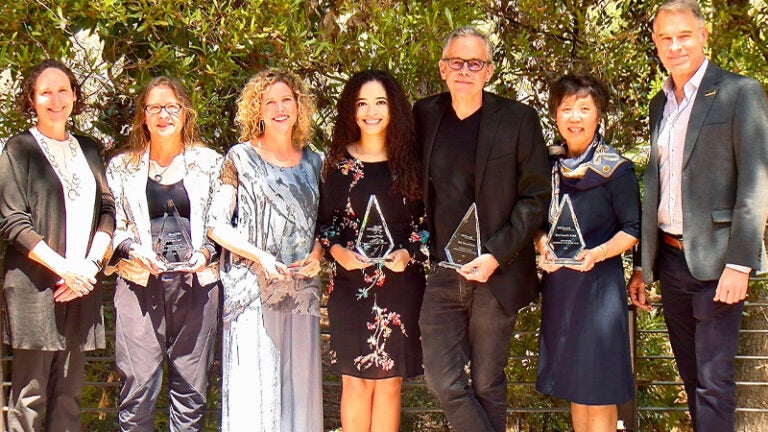
Inaugural Communicator of the Year Awards honor scholars who engage with the public
Five scholars at the USC Dornsife College of Letters, Arts and Sciences have been recognized for their exemplary efforts as communicators, sharing their expertise and engaging with the public.
The inaugural Communicator of the Year Awards honor scholars from the College who contribute significant time and effort to meaningfully improve the public’s understanding of issues, influence policy or raise the level of public discourse by:
- Publishing commentaries, including op-eds and articles for The Conversation
- Giving interviews to reporters, producers, podcasters and other media specialists
- Posting and engaging followers on social media
- Speaking to audiences outside of academia through TED-type talks, Dornsife Dialogues, panel discussions and similar events
Nominations for the awards were solicited from faculty and staff from throughout the university, and the USC Dornsife Office of Communication selected final winners from those nominations.
USC Dornsife Dean Amber D. Miller will present the awards at an upcoming luncheon honoring the winners.
“I’m grateful to scholars like you who exemplify the goals of our Academy in the Public Square initiative,” wrote USC Dornsife Dean Amber D. Miller in an email to the awardees.
Winners were chosen in five categories: humanities, natural sciences and mathematics, social sciences, center or institute leader, and PhD student.
Communicator of the Year, Humanities — Susan Kamei
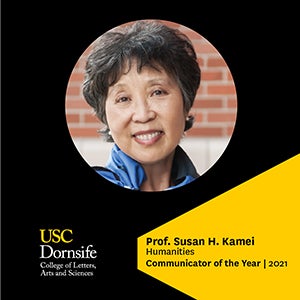
In 2021, Susan Kamei, a USC Dornsife lecturer in history, emerged as one of America’s most prominent and visible scholars on Japanese American incarceration during World War II.
While America marked the 80th anniversary of the Pearl Harbor attack, Kamei shared the lessons of the country’s unconstitutional wartime detention through a critically acclaimed book published by Simon & Schuster, numerous TV and radio interviews, public speaking engagements, and published commentaries.
The Los Angeles Times published Kamei’s powerful op-ed, “Captives in our own country: My family’s story helps shape my view of the incarceration of Japanese Americans,” and she was quoted or featured in stories by NPR, NBC, C-SPAN, and many more, always using her full USC Dornsife affiliation to help boost the reputation of the College and her department.
Following publication of her book When Can We Go Back to America: Voices of Japanese Incarceration During WWII, Kamei, who is also the managing director of the USC Dornsife Spatial Sciences Institute, had 23 public speaking engagements in conjunction with museums, libraries, community organizations, grade schools, and more. The events included a dialogue with Star Trek’s George Takei and a discussion hosted by Los Angeles Times reporter Teresa Watanabe.
She also published two articles for The Conversation, “How memories of Japanese American imprisonment during WWII guided the US response to 9/11” and “Japanese American soldiers in World War II fought the Axis abroad and racial prejudice at home,” that were republished by more than 30 news organizations.
Communicator of the Year, Natural Sciences and Mathematics — Anna Krylov
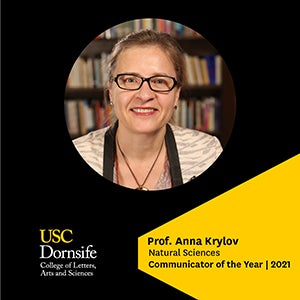
Communicating your ideas and expertise to a large audience can be anxiety-inducing. But promoting a position on a socially charged topic to the public and a large audience of scientists, who can be … well let’s just say, rather opinionated … takes a particularly elevated level of courage.
But with increased risk often comes increased reward, and for Anna Krylov, her willingness to address a heated topic within the science, engineering and math fields paid off in spades.
Writing in The Journal of Physical Chemistry Letters, Krylov, a USC Dornsife professor of chemistry, offered perspective on the growing influence of politics and moral trends (read: “political correctness”) within STEM fields. Referencing historical evidence and drawing from her own experiences as a scientist trained in the former Soviet Union, her paper, The Peril of Politicizing Science, warns of the dangerous potential for ideology to distract from and even infiltrate scientific principles and hinder progress.
The article attracted tremendous interest, whether the readers shared Krylov’s position or not, and launched a national conversation among scientists and the general public. Since its publication in June 2021 the paper has been viewed more than 77,000 times and has been cited by popular media outlets, including the New York Times, Quillette and several international publications. Not surprisingly, it’s also been a popular source of discussion on social media and Reddit.
Krylov continued to bring attention to this important topic last year, with several follow-up papers, podcast and blog interviews, YouTube videos, and a conference speaking engagement on the subject organized by Duke University’s Kenan Institute of Ethics. Invited to address the Free Speech Project in Belgium this year, Krylov has become a coveted speaker on the topic of political ideology influencing science, all while continuing her theoretical chemistry research at USC Dornsife.
Communicator of the Year, Social Sciences — Kyla Thomas
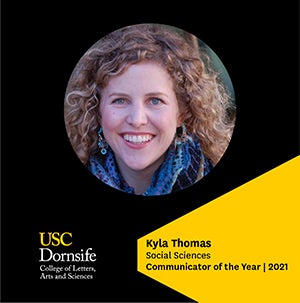
If you’re an Angeleno, it’s likely you’ve seen, heard or read a comment from Kyla Thomas in 2021. That’s because Thomas, an associate sociologist with the USC Dornsife Center for Economic and Social Research, has become a very popular source for local and even national media regarding her expertise on Los Angeles County’s changing social and economic conditions.
Thomas is director of USC Dornsife’s LABarometer, a quarterly survey that measures and tracks the opinions of Angelenos regarding life in L.A. County. In the last year, she has been quoted by the Los Angeles Timesand made appearances on every local TV and news radio station regarding topics such as the impact of the COVID-19 pandemic on Angelenos’ physical, economic and mental health, and how residents are adapting their lifestyle and behaviors in response to the growing threat of climate change.
As a scholar deeply committed to sharing her research to enhance public understanding of our world, Thomas authored two articles for The Conversation last year that were re-published by 47 news organizations including PBS Newshour and Yahoo News. She was also a panelist on a popular Dornsife Dialogue regarding “COVID’s lessons on inequality,” and her work was recently cited by L.A. County’s Chief Sustainability Office in its Climate Vulnerability Assessment.
As one of the nominators for Kyla notes, she “has emerged as a clear and authoritative voice that compels the public, other scholars, and policymakers alike to critically assess data with an eye toward equity.”
Communicator of the Year, Center or Institute Leader — Manuel Pastor
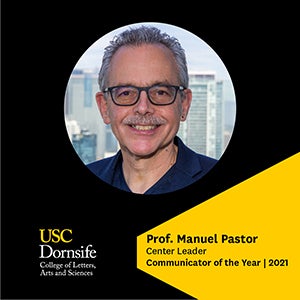
For many years, Manuel Pastor has been a ubiquitous presence on all forms of media, sharing his expertise and sharp analysis on a wide variety of topics related to equity and social change. Last year, the pandemic didn’t seem to slow him down.
Pastor, director of the USC Dornsife Equity Research Institute (ERI), co-authored two books published in 2021, Solidarity Economics: Why Mutuality and Movements Matter (Wiley) and South Central Dreams: Finding Home and Building Community in South L.A. (NYU Press).
He also co-authored several research reports on immigration, community power-building and other equity issues, all of which helped frame the 10 op-eds he wrote for the Los Angeles Times, San Francisco Chronicle, The Hill, and others.
When he wasn’t writing books, articles and research, he was often sharing his insight on equity and social change via interviews with news media that quoted him in hundreds of national and local stories last year, and via Twitter, where he engages with thousands of followers.
The Distinguished Professor of Sociology and American Studies and Ethnicity and holder of the Turpanjian Chair in Civil Society and Social Change was also a keynote speaker or presenter at several conferences last year, including the Latino Role Models Conference, and moderator of the Dornsife Dialogues event “COVID’s Lessons on Inequality.”
Communicator of the Year, PhD Student — Kiersten Formoso
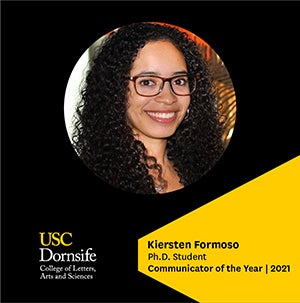
Through news stories, videos and a creative use of social media platforms, Kiersten Formoso, a doctoral candidate in the Department of Earth Sciences, is not only improving public understanding of dinosaurs, she’s inspiring young people to study paleontology.
Viewers of Formoso’s popular Twitch channel enjoy her streaming commentary regarding the dinosaurs and other ancient creatures in the video games she plays. But more than that, they learn from her. And on Twitter, where she has more than 8,600 followers, Formoso posts a constant stream of science commentary and humorous fossil memes, punctuated by her enthusiasm for pop culture.
Last year, Formoso took time from her program in vertebrate paleobiology and functional morphology to write an article for The Conversation regarding the physical traits of King Kong and Godzilla, analyzing the battle strengths of each creature prior to the premiere of the movie Godzilla vs. Kong. Nearly 50 news organizations republished the story, which was one of the most read articles written by a USC Dornsife scholar in 2021.
In a popular video for USC Dornsife’s YouTube channel last year, Formoso shared her insight regarding who would win the battle between the two movie monsters, and in a second video, she offered advice for young people considering studies in paleontology.
Formoso has found unique and compelling ways to bring the stories of fossils out of dusty museum drawers and into the public imagination.